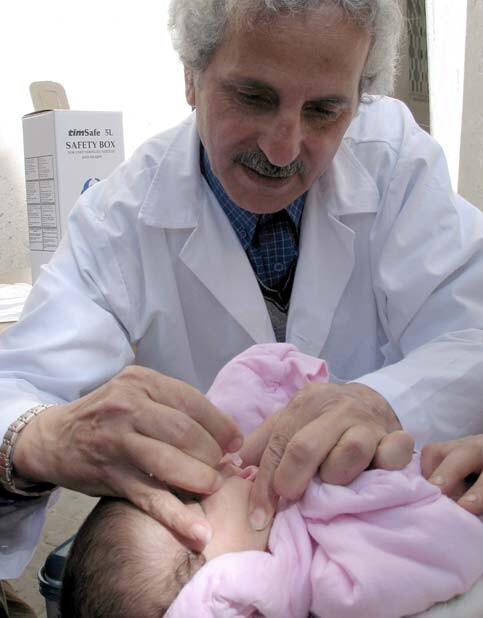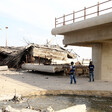The Electronic Intifada 26 June 2006

A Palestinian doctor giving a baby polio vaccine in a UN program to erase the disease from the Palestinian areas, April 10, 2005. (MaanImages/Mouid Ashqar)
On weekdays, he brings a new generation of Jewish Israelis to life. On weekends, he goes back to his Palestinian patients at the packed Jabaliya refugee camp to try and help them get appointments and transfers to the more developed Israeli hospitals.
Dr. Izzeldin Abuelaish, 51, gynecologist and obstetrician, is the first Palestinian doctor working at the Israeli Soroka University Hospital in the city of Beersheba.
He goes through security checks and a multitude of checkpoints almost every day to reach his workplace - a task he does with a smile on his face.
When he is off-duty at his home in the refugee camp, Abuelaish receives requests from many patients who have lost all hope in a cure and are resorting to him for a transfer to Israeli hospitals.
One can see all sorts of people with an array of illnesses sitting at a warehouse adjacent to his home that the physician has taken as a reception hall, while he sits among them exchanging anecdotes and scrutinising their papers.
With undying optimism, Abuelaish believes his work at Soroka Hospital can build bridges of peace between Israelis and Palestinians. He says his belief stems from the change of heart he sees in many of the Palestinian patients he has sent to Israel, and the Jewish mothers he delivers almost every day.
“There are many faces to this complicated conflict,” he says. “We can achieve our goals with reason, not brutal force. Science is our most valuable asset, and life is more precious than anything in the world.”
After completing medical school in Cairo, Abuelaish traveled to London on a scholarship to specialise in infertility studies. He noticed that most of the references he depended on in his thesis were written by Israeli professors.
“When I returned to the Palestinian territories in 1991, I opened my own clinic at the refugee camp, and in some difficult cases I used to call some Israeli professors for counsel. It’s then that I met Professor Mark Glezerman.”
Meeting Glezerman, Abuelaish emphasizes, was a key turning point in his life.
“I started out as a volunteer at Soroka Hospital, and Professor Glezerman was the one who offered me this, and was always there for me,” Abuelaish says. “It’s in him that I discovered humanity in the Jewish figure. I love this man and I’ll always think of him as a unique person I’ll never forget.”
For Abuelaish, starting to work officially at an Israeli hospital has been a challenge. He has to show up right on time or a little bit early, and prove to Israeli doctors that he is as professional and knowledgeable as them.
With persistence, professional work and a constant smile, Abuelaish has become “at home” at Soroka Hospital. He still remembers, with pride, the first lecture he gave there.
“I remember that the discussion was to be made in English because I didn’t know Hebrew at that time, and the professor who introduced me said before I started: ‘Dr. Izzeldin is a pure Palestinian. His family is deported from a village near Kibbutz Sderot.’ I gave my lecture, and when I finished all the doctors stood in ovation.”
Abuelaish is nicknamed “smiling doctor,” and always insists on introducing himself to his patients and telling them where he lives.
“Most of the reactions I receive when I introduce myself are positive, and I realise through my work that many Jewish Israelis don’t know of the suffering of Palestinians. I think this is common on both sides of the conflict,” Abuelaish says. “Hopefully my work at Soroka will help change that, one person at a time.”
His first exposure to media was in 1998, when he arranged for a visit of 40 Israeli professors to Gaza, headed by the dean of Ben Gurion University in Beersheba, to meet Palestinian doctors and officials. The Israeli press labeled him back then as the “unofficial envoy for the region.”
“I consider Soroka to be my home away from home. It’s the place where humanity can be discovered, where people are treated without racism and as equals,” Abuelaish says. “We leave the differences outside its walls.”
After many years working there, the “smiling doctor” has become a familiar and accepted face inside and outside the hospital. He remembers how many Jewish women that he delivered still recognise him in the street and greet him.
In March 2002, after a suicide bombing at a hotel in Israel, Abuelaish was banned from entering Israel for two months.
“It took many contacts by friends at the hospital and members of the Knesset [Israel’s parliament] before I was able to return to work. When I arrived at night, everyone was amazed and happy to see me,” he says. “I found flowers covering my office. I wished for people outside and politicians to witness this scene and to understand that the image isn’t completely dark.”
Abuelaish says his dogma in life is to be patient, calm and never become rash and impulsive - qualities that he confesses to having learned while waiting in line at Erez checkpoint, north of the Gaza Strip, before entering Israel.
“In the beginning, the soldiers were rude and arrogant, but with time and enough patience they learned to accept my existence and that I’m a human being just like them. Now, they ask me for birth-control pills for their girlfriends and some medical advice whenever I pass,” the doctor adds with a grin.
He considers that one of his greatest achievements was managing to convince an Israeli pilot to stop bombing the Gaza Strip during this intifada.
“I said at the time that I felt strange toward him [the pilot] because I know that most jetfighters fly from a base near Beersheba, so that means I might have delivered a child for this pilot’s mother or sister, or even his own child,” Abuelaish reminisces.
Shortly afterwards, an Israeli pilot announced that he would not go on missions to bomb Palestinian population centres again - sparking a wave of Israelis following suit.
Abuelaish still works at Soroka, and handles a significant amount of transfers to Israeli hospitals through his contacts on both sides. He received most recently a master’s degree in public health from Harvard University, after the hospital helped him raise funds for studying.
“I’ve accepted an advisory position with the World Health Organisation in Afghanistan, so I’ll be gone from Soroka for some time. I’ll miss it, though, and will never forget my friends and family there,” he says.
About his hopes for a peaceful coexistence between Israelis and Palestinians, Abuelaish is optimistic. The key to building just and everlasting peace with the Israelis, according to him, is efficiently delivering the following message to them in their own language:
“Palestinians are human beings worthy of their rights, and they respect the right of the State of Israel to exist.”
This message is one that he is trying to teach his eight children, as well as the patients whose transfers he handles.
“I wish for the day when the Palestinian human being will have a place on this land like any other country, and where his life has value and meaning,” he says.






